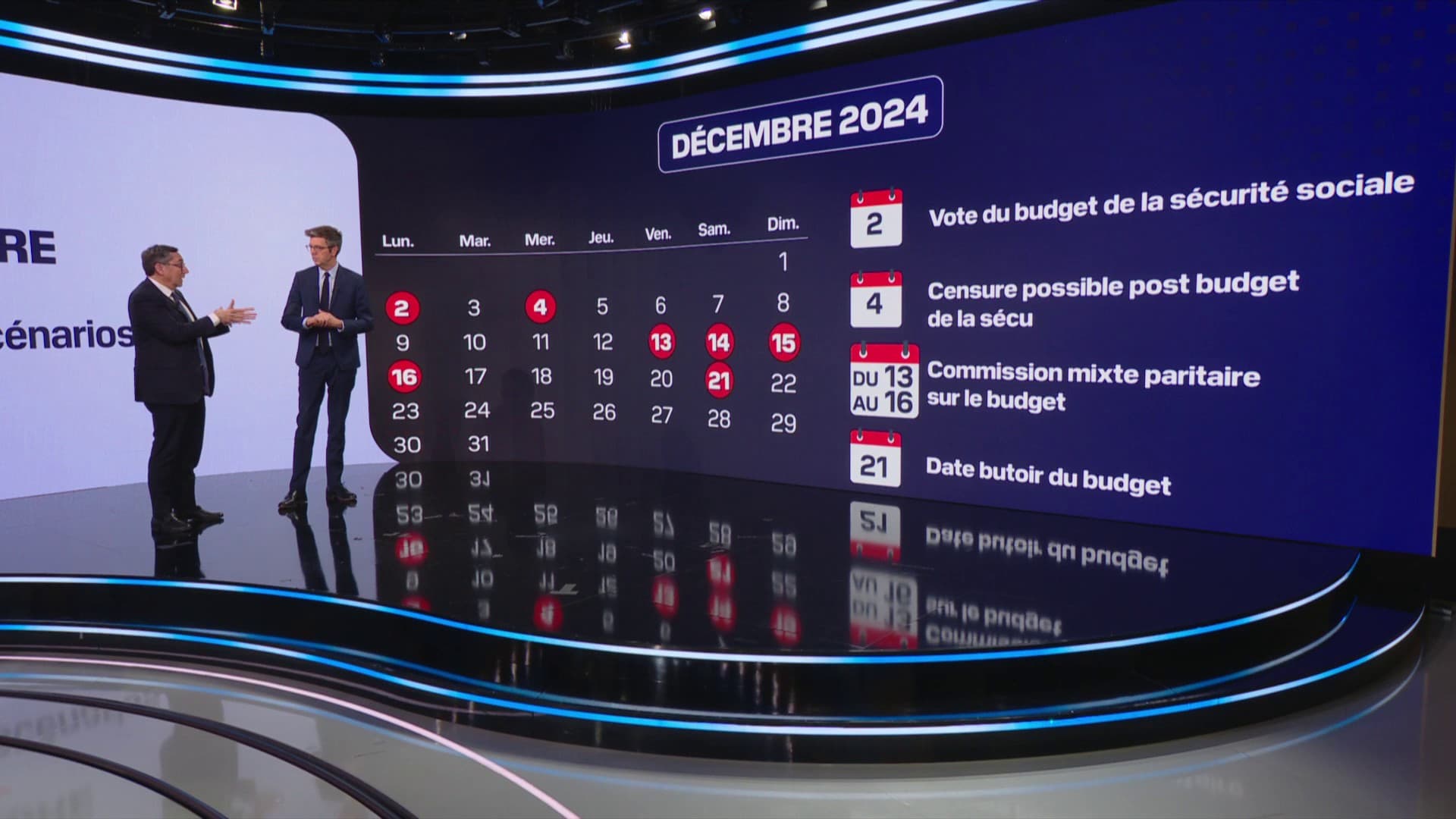It’s just a matter of days. The Socialist Party (PS) confirmed this Wednesday, November 27, that it will vote on the motion of censure against Michel Barnier if the Prime Minister obtains 49.3 to approve the State and Social Security budgets without a vote.
With the RN aligned behind the rebels and the New Popular Front, the government should fall towards the end of the calendar year. But when exactly? BFMTV.com takes stock of the political calendar in the coming weeks.
• Option 1: starting Wednesday, December 4
The parliamentarians members of the Joint Commission reached an agreement this Wednesday, November 27, on a compromise text on the social security budget. This version of the bill will be put to a vote by deputies for the last time this Monday, December 2, starting at 3 p.m.
But not having a majority in the National Assembly, Michel Barnier would probably have to activate article 49.3 of the Constitution for the PLFSS to be adopted without a vote. The deputies will have 48 hours to present a motion of censure. Rebellious France warned: the text is already written and the signatures are ready.
If the motion of censure is presented on Monday afternoon as planned, it will be examined during the week, at the earliest 48 hours after its presentation, that is, on Wednesday afternoon, December 4. At the latest, the debate “will take place on the third day of the session following the expiration of the constitutional period of forty-eight hours after the presentation,” states the National Assembly website. Or Monday, December 9.
At this stage, only the NFP is certain to vote on a motion of no confidence tabled in response to a 49.3 in the PLFSS. RN parliamentarians will meet this Thursday, November 28 at 2 p.m. to discuss their strategy.
• Option 2: starting Friday, December 6
If Marine Le Pen’s party adds its votes to the left, the calculation is simple: Michel Barnier falls at the beginning of December. But the extreme right can also give him a slight respite by deciding not to vote on this first motion of censure. First… Because another, less emblematic text, which sets the budget adjustments for the year 2024, should reach the mixed commission on Tuesday, December 3.
If agreed, it will be put to a vote by deputies the next day and will probably be adopted by 49.3 votes in the National Assembly. There will therefore be another risk of a motion of censure, which will be discussed at the earliest on Friday, December 6. And no later than Wednesday, December 11.
• Option 3: starting Friday, December 20
A 49.3 is also expected in the state budget, the famous finance bill. Currently debated in the Senate, it will likely be adopted by the right-wing majority. Like the PLFSS, a Joint Commission will meet once the text has been voted on.
Whether or not the CMP is conclusive, the Government will present a text on Wednesday, December 18 to the National Assembly at 9:30 p.m., according to the schedule provided by the Lower House. Without a majority, Michel Barnier will get, if he remains in office, a third 49.3.
A motion of censure will again be signed by the left and studied no earlier than 48 hours after its presentation, that is, on Friday, December 20, at 9:30 p.m. During the debates and votes (in the offices of the National Assembly), Yaël Braun-Pivet could announce the adoption – or rejection – of the motion of censure shortly after midnight on Saturday, December 21.
Voting on a motion of censure during Christmas week seems ruled out: the National Assembly will suspend its work from Monday, December 23 to Sunday, January 12.
Only the RN can save Barnier
Therefore, the oppositions have three cartridges to overthrow Michel Barnier’s government: the PLFS starting on Wednesday the 4th, the end of administration bill starting on Friday the 6th and the PLF starting on Friday the 20th of December.
Only a change of heart on the part of the National Rally could, at this stage, save the Prime Minister. “We will vote on the motion of censure with the New Popular Front,” said Jean-Philippe Tanguy during a press conference this Wednesday morning on BFMTV.
“Democratic institutions and reality demand that we sometimes vote with our political enemies. “That’s what counts is the effect,” he said.
Source: BFM TV


